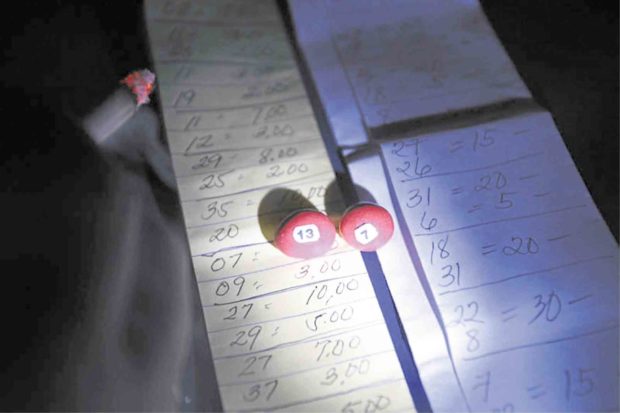
INDEFENSIBLE Police officers are duty-bound to enforce laws against “jueteng,” which remains rampant despite the small town lottery of the Philippine Charity Sweepstakes Office. —INQUIRER FILE PHOTO
MANILA, Philippines — Illegal gambling methods like the numbers game “jueteng” still exist in the country due to problems in enforcing laws, the Philippine Charity Sweepstakes Office (PCSO) chairperson told the House of Representatives on Tuesday.
Junie Cua, PCSO Chairperson, said he had witnessed a pervasive culture of illicit games despite the agency’s Small Town Lottery (STL) game being established to counter jueteng and provide revenue to the government.
“Opinion ko lang ‘to after a few weeks that I was there, that I am there at the PCSO. Hindi pa rin nawawala ang kultura ng illegal — ‘yong kultura na to make a fast buck, hindi pa naiiwasan ‘yong collusion and conspiracy,” Cua said during the House committee on appropriations’ deliberation of PCSO’s budget for 2023.
(This is just my opinion after a few weeks that I was there at the PCSO. The culture of having illegal games, the culture to make a fast buck is there. They have not avoided collusion and conspiracy.)
“Ang law enforcement is still very bad, they have marching orders, but they are not doing it. So kinakailangan paulit-ulit (So it has to be repeated),” he added.
Cua explained that officials of the Department of the Interior and Local Government (DILG) or even the President have to issue pronouncements or even go out to remind law enforcement agencies about their mandate to stop illegal games like jueteng.
To counter this, Cua — a former lawmaker himself — suggested that Congress can come up with a bill that would help decrease the operations of illegal games.
“Kailangan every now and then lalabas ang Secretary of DILG to remind or the President to remind. Gano’n ang nangyayari eh. So I think this is an issue that also needs to be studied by Congress, baka may way — by way of legislation — na mami-minimize kung hindi ma-eradicate ang illegal,” he said.
(The secretary of DILG or even the President has to go out now and then to remind law enforcers. That’s the reality. So I think this issue also needs to be studied by Congress; maybe there’s a way through legislation to minimize, if not eradicate, the illegal games.)
“So maybe some kind of legislation that would really force the enforcers na talagang tumulong na sa gobyerno, mawala na lahat ng iligal, mapunta ang pera sa gobyerno,” he added.
(So maybe some legislation would force the enforcers to help the government eradicate illegal games and bring all revenues to the government.)
It was brought up after Bienvenido Abante Jr., a representative for Manila’s 6th district and vice chair of the appropriations committee, voiced his disgust with the STL for failing to put an end to jueteng.
Abante also questioned why STL revenues increased during the pandemic when the overall revenue of PCSO decreased during the first two years of the COVID-19 pandemic.
In response, Cua said that several STL sites reopened as PCSO was looking for possible sources of revenue during the onset of the pandemic.
“Bakit tumaas (Why did it increase) during (the) pandemic? Ang sagot ng staff ko doon is (My staff said) that during this period, maraming (several) areas na na-open, and I think understandably, PCSO was looking for sources of revenue, and therefore those areas that were closed before had to be studied and be opened so that we can raise more revenues,” Cua explained.
“Now, I’d like, Madam chairperson, to react to a very good point raised by Bishop Benny. Ang ating paniwala kasi itong STL, pagka ito ay naisabatas o naging legal I mean to say, eh mawawala na ‘yong illegal. That was an expectation that never happened,” he added.
(Now, I’d like, Madam chairperson, to react to a very good point raised by Bishop Benny [Abante]. We thought this STL would remove the illegal once enacted or legalized. That was an expectation that never happened.)
STL had already been integral to PCSO’s operations when the COVID-19 outbreak struck the country. In his presentation, Cua showed that P15.74 billion came from the STL or 29.6% of 2017’s total revenue of P55 billion.
STL’s share of the pie even grew in 2021 and 2022: according to data from Cua, the said game contributed at least 49 percent to the PCSO’s revenue in 2021, or P21.55 billion out of the total P43.36 billion of that year.
For the first semester of 2022, STL now accounts for 51 percent of the PCSO’s revenue — P13.30 billion out of the P25.92 billion.
STL was established in 1987 to eradicate jueteng by introducing a similar game, where players have to choose two numbers and those with the same number combination with the operator are considered winners.
However, over the years, several critics of the STL have claimed that the game is only a front for jueteng, which remains illegal.
READ: Small Town Lottery a front for jueteng, Philippine National Police admits
Last 2019, former Interior secretary Eduardo Año said jueteng had been eradicated, but several jobless STL collectors mulled returning to the illegal game amid the loss of jobs during the pandemic.
RELATED STORIES:
Jobless STL collectors mull return to ‘jueteng’